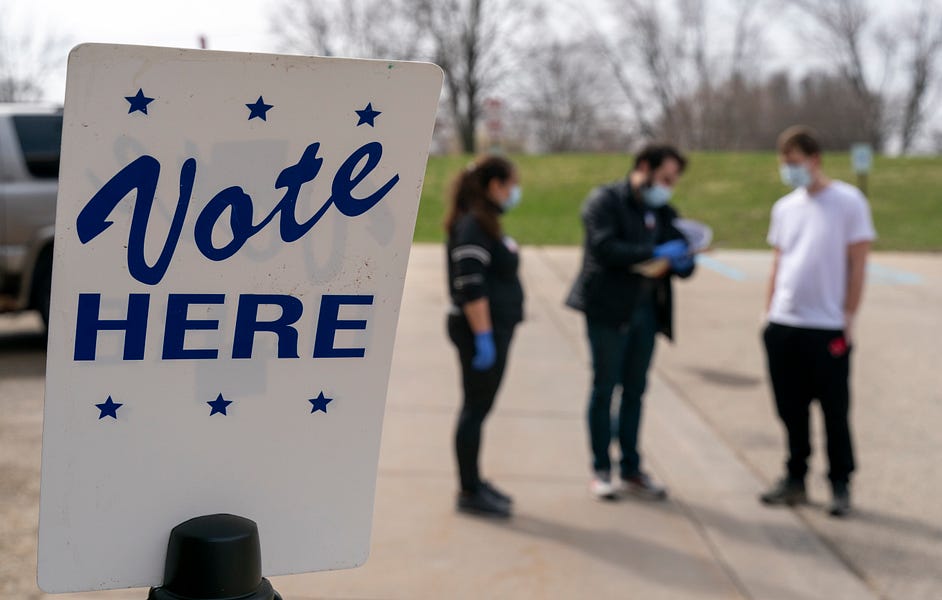Recent polls show President Trump and former Vice President Joe Biden in a virtual tie in national polls. State polls show the race as a tossup. Come November, the country may find itself in a situation where neither candidate has sufficient electors (270) to win.
This is where Congress comes in. The 12th Amendment requires it to settle contingent elections. The process requires members of the House of Representatives to vote for the president; and the Senate votes for the vice president. Since the passage of the 12th Amendment, Congress has decided two elections: In 1825, the House chose John Quincy Adams over Andrew Jackson, who had won a plurality of the popular vote and 99 electors to Adams’ 85. In 1877, Congress intervened after a dispute over ballots in a handful southern states, forming the Federal Election Commission and ultimately granting victory to Rutherford B. Hayes over Samuel Tilden.
In the House, each state in the union gets one vote. Which means, for example, that Pennsylvania’s 18 representatives (nine Democrats and nine Republicans) would need to come together to choose either Biden or Trump (assuming nobody else is in the running). Whichever presidential candidate gets 26 votes becomes president.
In the Senate, matters are a little less complicated. Each senator gets one vote. The candidate who gets 51 becomes vice president.
The upcoming election process faces three perils.
First, Congress, which is recessed until May 4 because of the pandemic, may have difficulty meeting if COVID-19 continues to menace Washington, D.C. Neither chamber presently has in place rules that enable it to vote remotely.
A second problem for Congress is how to handle a deadlocked state legislative vote on which presidential candidate won. If, say, a state has a presidential election that is too close to call (e.g., Florida in 2000) and its legislature cannot decide on a result, then it is not clear what happens. Each legislative chamber could send its own verdict on who won to Congress. But the 1887 Electoral Count Act (ECA) seems to say the state’s governor should choose, but legal scholars say the law is vague, and it is unclear whether Congress would need to abide by the governor’s choice and how Congress should count the submitted votes. If that were not trouble enough, some legal scholars question the constitutionality of the statute, which invites court challenges to any actions Congress takes under it. The Bush v. Gore battle of late 2000 should have spurred Congress to act. But the fight was toxic and resolved by the high court before the problems were fixed.
Third, and morbidly, Congress presently lacks a procedure to handle the death or disability of a presidential or vice presidential candidate during a contingent election. Come November, Trump will be 74 and Biden will turn 78, and will have endured a long, hard campaign. Whoever wins will be the oldest person ever elected president. If one of them or their running mates cannot serve, there are no agreed upon rules to provide a substitute candidate. Congress would be without a map for proceeding, and the selection of the president delayed for months.
Yes, contingent elections are very rare. But COVID-19 is a harsh reminder that black swans do visit. So too the fact that three of the five presidential elections since 2000 have been close.
All three of these problems are surmountable. Congress could try to adopt remote voting rules, or it could stock up on the appropriate masks and protective equipment to meet in person.. The ECA can be replaced by a statute that makes plain how Congress will count state electoral votes. And the Section 4 of the 20th Amendment, which was adopted in 1933, authorizes Congress to lay out a process for selecting a replacement candidate for a stricken or deceased president or vice president.
Twenty years ago, the country suffered through the long, and ugly Bush v. Gore battle over who won Florida. The scars of that disputed election remain to this day.
Nobody wants a repeat. Congress needs to act promptly to head-off what could be an even more painful battle for our country.
Kevin R. Kosar is the vice president of research partnerships at the R Street Institute and edits LegBranch.org.
Photograph by Andy Manis/Getty Images.







Please note that we at The Dispatch hold ourselves, our work, and our commenters to a higher standard than other places on the internet. We welcome comments that foster genuine debate or discussion—including comments critical of us or our work—but responses that include ad hominem attacks on fellow Dispatch members or are intended to stoke fear and anger may be moderated.
You are currently using a limited time guest pass and do not have access to commenting. Consider subscribing to join the conversation.
With your membership, you only have the ability to comment on The Morning Dispatch articles. Consider upgrading to join the conversation everywhere.